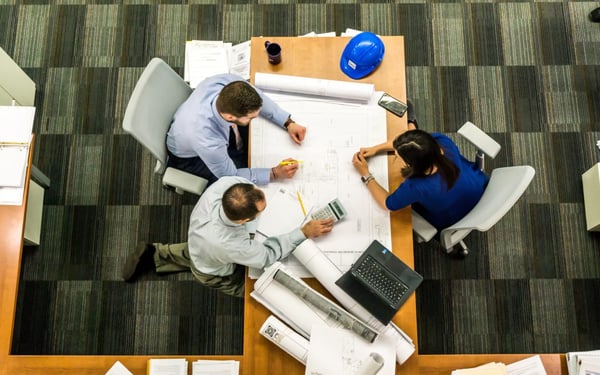Smart construction is not the same thing as SMART Technology, although it would be easy to confuse the two. SMART is an acronym that stands for Self-Monitoring Analysis and Reporting Technology. Smart construction, while utilizing technology, encompasses more.
According to the Construction Leadership Council, an UK-based organization, smart construction is defined as, “building design, construction and operation that through collaborative partnerships makes full use of digital technologies and industrialized manufacturing techniques to improve productivity, minimize whole life cost, improve sustainability and maximize user benefits.”
Using digital technologies and industrialized manufacturing techniques go hand-in-hand. Digital technologies like Building Information Modeling and Construction Management Software are two examples of this technology. There are also smart contracts, drones, augmented reality and more. All of these technologies make the manufacturing process more precise, creating less waste and limiting delays. They also create transparency for all stakeholders, especially when smart contracts and BIM is used because updates occur in real-time.
Manufacturing techniques also involve off-site pre-fabrication. This occurs in a controlled environment, which means cuts are precise, making materials estimates more accurate and ensuring more timely completion. This process also means that when the materials get to the job site, it takes less time to put together because most of it is already done. Time saved is money earned.
Minimizing whole life cost, improving sustainability and maximizing user benefits all go together. When cost is reduced for the life of the building, that generally means it’s sustainable and will be viable for a long time. Using proper materials and processes is vital to sustainability, so implementing digital technologies and industrialized manufacturing techniques will go a long way toward this goal. In the end, user benefits will increase when all of these parts come together.
Why is smart construction important, though? According to Siemens, we spend up to 90% of our time in buildings. Siemens says, “While it’s true that today’s buildings should be efficient, reliable and safe – these characteristics alone don’t enable businesses and empower people the way a true smart building can.” If we are going to spend so much time inside a building, then that building needs to be sustainable and also provide reliable environmental conditions which promote healthy living.
Another reason it’s important is because, according to Electrical Construction Maintenance Magazine, “Smart technologies can reduce a building’s energy use by nearly a fifth.” While the article goes on to say that this varies by market segment, all markets can benefit from smart technology implementation during the construction process. Reducing energy use is one of the components of green building, which is fast becoming the way construction is done due to its reduced impact on the environment overall.
Smart construction is important for a variety of reasons, and implementing it is not difficult. Be sure to check out the articles on cabling, roofing, windows, heating and cooling, energy efficiency, solar power and sustainability. All of these pieces go together to create a product with the least environmental impact that is long-lasting and self-sustaining.

Recent Posts
- Spec Home Loans: Complete Guide to Construction Financing for Builders
- Spec Construction Loans: A Spec Line of Credit Is Worth the Paperwork
- Spec Homes and Pre-Sale Homes: Relative Benefits for a Spec Builder
- Spec Construction Success: Insights for the Investor Builder
- How Is a Spec House Different From Other Kinds of House Construction?
